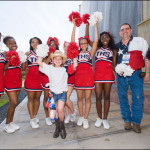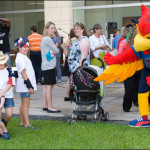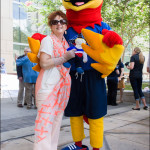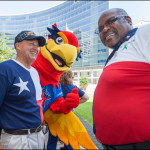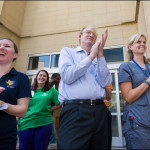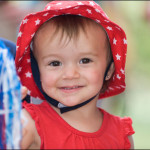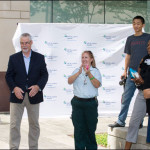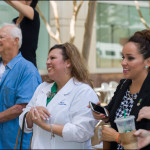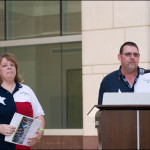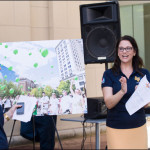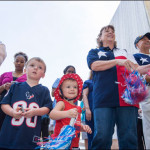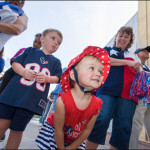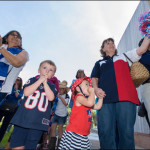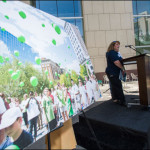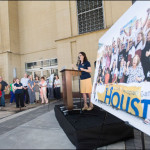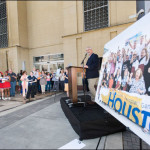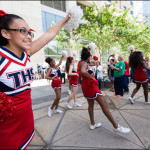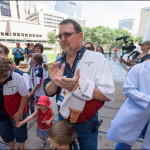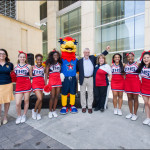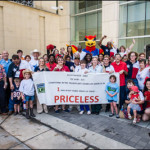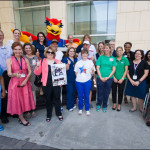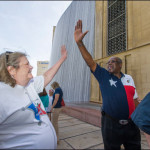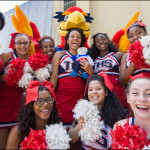
A pediatrician sees hundreds of patients a year. Some stick out in their mind more than others, but for Dr. Michael Bishop, pediatrician at Texas Children’s Pediatrics Grand Parkway, the Stovall family is one that he will never forget.
Last year, while on vacation in Galveston, Bishop experienced shortness of breath which prompted his wife to drive him back to Houston for immediate evaluation. Following a week in the hospital with more questions than answers, he was diagnosed with atypical hemolytic uremic syndrome (aHUS), a rare genetic disease that affects kidney function. Once diagnosed, Bishop was given both oral and IV medication, but dialysis four nights per week also was required due to the failure of his kidneys to recover from the illness.
Shortly after the diagnosis, his daughters started a Facebook page to raise awareness about aHUS and the importance of kidney donation. Because the disease is genetic, none of his family members were able to donate, thus the need to broadly share his story. Patients at his practice started asking about the Facebook page and how they could help.
“The support from my patients and their families was overwhelming,” said Bishop. “I believe that I have been blessed by God to be given the privilege of taking care of children and their families. I never thought I’d receive the greatest gift of all from one of them.”
Jennifer Kennedy-Stovall’s three sons have been patients of Bishop’s since they were born. Now 10, eight and four, the boys are frequent visitors to Texas Children’s Pediatrics Grand Parkway whether for a well-child check-up or an acute illness. Bishop had been out of the office during a few of the Stovall boys’ visits and Jennifer wondered if he was battling a serious health issue. When the family saw Bishop during their next visit, they noticed that he just wasn’t the same – he wasn’t cracking jokes, he was more introverted and more than just the physical changes that occurred since his diagnosis, his personality had changed as well. Bishop shared the news of his diagnosis and his need for a kidney. Kennedy-Stovall walked out of the room and had a feeling.
“I walked out of the room and knew that I had to do something to help,” said Kennedy-Stovall. “I began the living donor kidney screening process that day.”
Kennedy-Stovall went through four rounds of intense screening to determine if she was a match for Bishop. Through blood tests, numerous blood pressure screenings, medical history reports, scans, x-rays and consultations with a nephrologist and social worker, Kennedy-Stovall found out that she was a match.
“When I found out I was a match, my husband and I didn’t hesitate,” Kennedy-Stovall recalls. “I felt like this was something I had to do from the moment Dr. Bishop told me he needed a transplant and I couldn’t have been happier to do this for him.”
Ironically, Kennedy-Stovall and one of her sons had a visit scheduled for the next day with Bishop. She went to the appointment not knowing if he had heard the news yet. She asked if he had any news to share and Bishop said there was testing ongoing, but that no match had yet been reported to him. Little did he know that, momentarily, she told him that she was going to be his living donor.
The families prepared, and the surgery was scheduled. The surgery was successful for Bishop and Kennedy-Stovall, and their recoveries were seamless. On July 16, Bishop celebrated his one year transplant anniversary and is thriving. The Bishops and Stovall families have grown incredibly close through their journey, oftentimes sharing lengthy family dinners together.
“I can’t believe it’s been a year,” said Bishop. “So many thoughts come to mind, but unpayable gratitude is at the top of the list. My patients are my second family, and they mean a lot to me. I’m so proud that I can come back to the practice and continue to do what I love because of this unbelievable gift from Jennifer and her family.”





